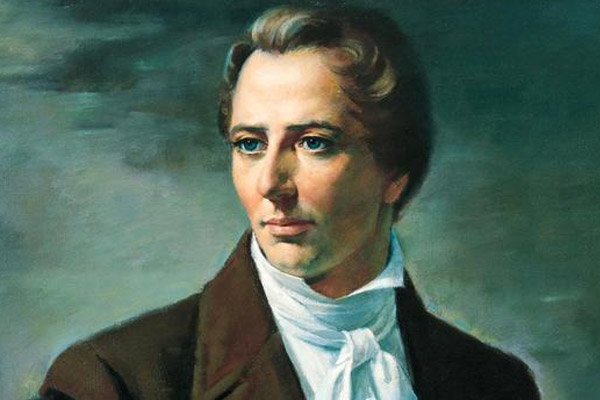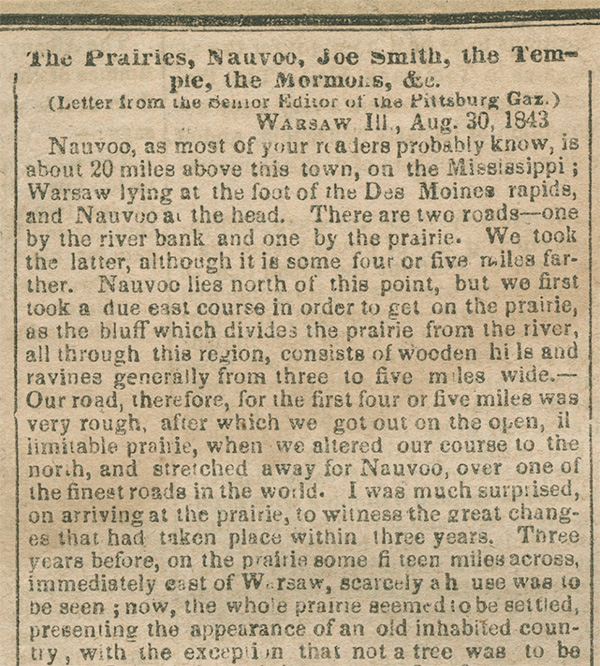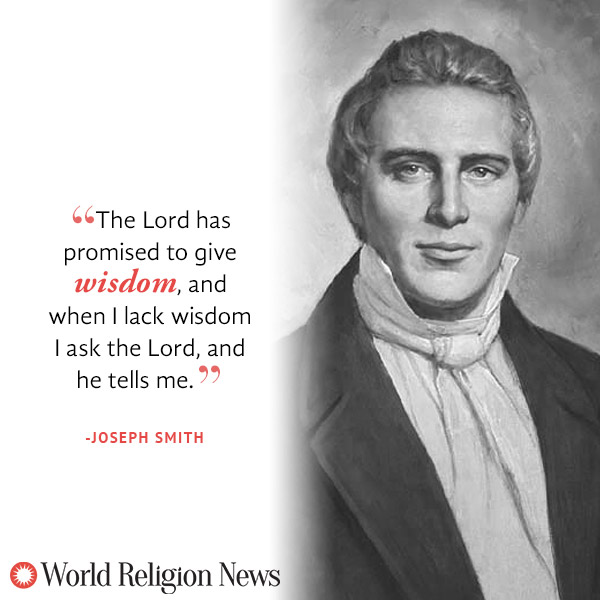
Joseph Smith Recalls Revelation from God in 1843 Nauvoo Interview
- By WRN Editorial Staff --
- 29 May 2015 --

Joseph Smith, founder of the Church of Jesus Christ of Latter-day Saints, is interviewed at his home in 1843.
The prophet Joseph Smith discusses politics, his revelation from God, and the persecution he faced.
This interview originally appeared in New York Weekly Express on September 29, 1843. It’s presented as part of our #InTheirOwnWords series.
The Prairies, Nauvoo, Joe Smith, the Temple, the Mormons, &c. (Letter from the Senior Editor of the Pittsburg Gaz.)
WARSAW Ill, Aug. 30, 1843 Nauvoo, as most of your readers probably know, is about 20 miles above this town, on the Mississippi; Warsaw lying at the foot of the Des Moines rapids, and Nauvoo at the head. There are two roads—one by the riverbank and one by the prairie. We took the latter, although it is some four or five miles farther. Nauvoo lies north of this point, but we first took a due east course in order to get on the prairie, as the bluff which divides the prairie from the river, all through this region, consists of wooden hills and ravines generally from three to five miles wide.—Our road, therefore, for the first four or five miles was very rough, after which we got out on the open, il limitable prairie, when we altered our course to the north, and stretched away for Nauvoo, over one of the finest roads in the world. I was much surprised, on arriving at the prairie, to witness the great changes that had taken place within three years. Three years before, on the prairie some fifteen miles across, immediately east of Warsaw, scarcely a house was to be seen; now, the whole prairie seemed to be settled, presenting the appearance of an old inhabited country, with the exception that not a tree was to be seen. I was informed that twenty-five farms could be counted from one hillock on this prairie. But our course north soon took us from this settled country, and we travelled over vast prairies, extending in every direction as far as the eye could reach, except on our right, where lay the bluff which intervened between us and the river. Herds of cattle could occasionally be seen dotting the surface of the earth, and it wanted but a small stretch of imagination to fancy these the primeval lords of the prairie, the fierce buffalo, that a few years ago roamed in solitude and security over these inland oceans.
” ”The world persecutes me, it has always persecuted me.”
As we approached the “kingdom” as Nauvoo is denominated here, the country again began to be settled, while the luxuriant herbage of the prairie was cropped quite short by the herds of cattle belonging to the mormons. Most of the prairie, near Nauvoo is fenced with turf. A ditch some two feet deep is dug on each side of the fence, and the turf piled up between, making a very good and durable fence. These fences are broad enough on the top for a foot path —Quite a number of the houses or huts in which the inhabitants on the prairies live are also made of turf, and covered with clap boards. As this turf is black, as is all the soli on the prairies, these huts present a very somber appearance, and there is not a tree , and scarcely a hillock to ward off the scorching sun of summer, or the cold blast winter, they present a very bleak and desolate appearance. As we neared the city, about six o’clock in the evening, we passed an immense herd of cows which were being driven into the city, from the prairie, to supply the inhabitants with milk. We passed a large number of wagons loaded with hay, the natural grass of the prairie. About three miles from the river, we entered the “kingdom of Nauvoo;” it being about four miles long, up and down the river, and three miles broad. The part near the prairie, about a mile and a half from the river, is quite broken up with ravines; nevertheless it is all laid out in acre lots, and more or less settled. We drove near the river, and put up at a very respectable tavern, kept by one of the elders—a temperance house. After tea we walked out past the house of the prophet, who has a very good garden containing about an acre, with a very fine fence around it, painted white, as is also his house, a moderate sized, and humble looking frame dwelling. Near the prophet’s, on the other bunk of the river, is the site of the “Nauvoo House,” building by revelation. The basement is finished, it is built of good, hard white stone. The front on the river is about 140 feet and is entirely of cut stone. It has a wing running back about 100 feet. All this work is of the best and most substantial character. When this building is finished, it will be equal to any hotel in the western country. By special revelation, the prophet and his heirs are to have a suit of rooms in this house forever.

The next morning, after breakfast, we paid a visit to the prophet. We were received in a common sitting room, very plainly furnished, where, the prophet and the older members of the family had just been breakfasting, and his numerous children and dependents were then sitting at the table. He received us in quite a good humored, friendly mariner, asked us to sit down, and said be hoped for a better acquaintance. On the gentleman who accompanied me asking him how he prospered he replied, “None can get ahead of me, and few can keep behind me.” He seemed to think he had said something very witty, for he laughed very heartily. We spent about an hour conversing on various subjects, the prophet himself, with amazing volubility, occupying the most of the time, and his whole time was himself. Let us give what turn we would to the conversation he would adroitly bring it back to himself. The gentlemen who accompanied is a strong Whig, and as the Mormon vote had been given at the recent election to the Locofoco candidate for Congress, thereby defeating Cyrus Walker, Esq Whig, who had defended “Joe” in several law suits with the Missourians, the conversation took a political turn at first, “Joe” professed to be a great friend to Mr. Walker, and said he had voted for him, but would not interfere with his people in the matter. He said he had never asked the Lord any thing about ““The Lord has promised to give wisdom, and when I lack wisdom I ask the Lord, and he tells me, and if he didn’t tell me, I would say he was a liar; that’s the way I feel.”politics; if had done so, the Lord would have told him what to do. “The Lord,” said he, “has promised to give wisdom, and when I lack wisdom I ask the Lord, and he tells me, and if he didn’t tell me, I would say he was a liar; that’s the way I feel. But I never asked him any thing about politics. I am a Whig, and I am a Clay man. I am made of Clay, and I am tending to Clay, and I am going to vote for Henry Clay; that’s the way I feel (A laugh). But I won’t interfere with my people religiously, to affect their votes, though I might to elect Clay, for he ought to be President. I have sworn by the eternal gods-it’s no harm to swear by the gods, because there are none, if there is only one Gad, there can’t be gods, and it’s no harm to swear by nothing, (a laugh)—I have sworn by the eternal gods that I never will vote for a democrat again; and I intend, to swear my children, putting their hands under the thigh as Abraham swore Isaac, that they will never vote a democratic ticket in all their generations. It is the meanest, lowest party in all creation.—There is five-sixths of my people so led away by the euphoneous term “democrat,” that they will vote the Locofoco ticket. I am a democrat myself. I am a Washington democrat, a Jefferson democrat, a Jackson democrat and I voted for Harrison, and I am going to vote for Clay. The Locofocos are no democrats, but the meanest, lowest, most tyrannical beings in the world.-They opposed me in Missouri, and took me prisoner, and were going to shoot me for treason, and I never had committed any treason whatever.-I never had any thing bigger than a jack-knife about me, and they took me a prisoner of war, and twenty men to guard me. I had nothing to do with fighting. Our men, six hundred strong, were in arms, under Col. Hinckle. When the Missourians came marching up, Col. Hinckle ordered us to retreat, when I lifted up my hand, and said, “Boys I think we won’t go yet; we’ll stand our ground,” and they stood firm, but Col. Hinckle run like the devil. For doing this, they charged me with treason.”
“The Lord does reveal himself to me I know it. He revealed himself to me first when I was about fourteen years old, a mere boy.” In this manner the prophet ran on, talking incessantly speaking of revelations, he stated that when he was in a “quandary,” he asked the Lord for a revelation, and when he could not get one, he “followed the dictates of his own judgment, which was as good as a revelation to him; but he never gave anything to his people as revelation, unless it was a revelation, and the Lord did reveal himself to him.” Running on in this voluble style, he said: ”The world persecutes me, it has always persecuted me.—The people of Carthage, in a public meeting lately, said, “as for Joe, he’s a fool, but he’s got some smart men about him.” I’m glad they give me so much credit. It is not every fool that has sense enough to get smart men about him. The Lord does reveal himself to me I know it. He revealed himself to me first when I was about fourteen years old, a mere boy. I will tell you about it. There was a reformation among the different religious denominations in the neighborhood where I lived, and I became serious, and was desirous to know what Church to join. While thinking of this matter, I opened the Testament promiscuously on these words, in James, ‘Ask of the Lord who giveth to all men liberally and upbraideth not.’ I just determined I’d ask him. I immediately went out into the woods where my father had a clearing, and went to the stump where I had stuck my axe when I had quit work, and I kneeled down, and prayed, saying, ‘O Lord, what Church shall I join?’ Directly I saw a light, and then a glorious personage in the light, and then another personage, and the first personage said to the second, “Behold my beloved Son, hear him.” I then, addressed this second person, saying, “O Lord, what Church shall I join?” He replied, “don’t join any of them, they are all corrupt” The vision then vanished, and when I came to myself, I was sprawling on my back; and it was sometime before my strength returned.

When I went home and told the people that I had a revelation, and that all the churches were corrupt, they persecuted me, and they have persecuted me ever since. They thought to put me down, but they haven’t succeeded, and they can’t do it. When I have proved that I am right, and get all the world subdued under me, I think I shall deserve something. My revelations have proved to be true, because they have been delivered before they came to pass, and they came to pass exactly. I had a revelation in Missouri which was fulfilled to the letter. The Missourians had got us all prisoners, and were threatening to kill us. The principal men of us were lying under a log, with a guard standing a round us in the night. I fell into a trance. I call it a trance. I heard a voice which said Joseph fear not, you and all your friends shall be delivered without harm, and shall yet stand upon the hills of Zion. When I awoke out of the trance, I aroused Elder Rigdon who was by the side of me, and said, I have a revelation we shall all escape. Elder Rigdon shouted, and told it to the next one, and in the morning it was told to my family and all our friends, and they all rejoiced. That revelation came to pass, although they were holding a council at the time I had the trance, and had resolved to kill me. They can’t harm me. I told my family lately, before I left home for Dixon, that if I was taken up the Lord would deliver me, didn’t I Emma—(appealing to his wife, who was standing behind his chair, playing with his hair, and who answered in the affirmative)—and when they took me I was passive in their hands, and the Lord compelled them to bring me right to Nauvoo. They couldn’t help themselves although they gnashed their teeth with rage.”
Speaking of the temple, which he is erecting, he said, “I don’t know how the world will like it; it suits me; I have no book learning; I’m not capacitated to build according to the world; I know nothing about architecture, and all that, but it pleases I me; that’s the way I feel.”
A good deal of conversion of a similar character took place, the prophet occupying neatly the whole time, and talking of himself incessantly.—Judging from his conversation, manner, and appearance I should think him a man of small capacity, smaller acquirements, and a dupe to his own impostures. His language is rude and vulgar, and his conduct light and trifling. He is fond of his own jokes, and low wit, and laughs immoderately when he thinks he has said a good thing. He is a large, fleshy man, with a fine blue eye, large and sensual looking mouth and lips, with an evident predominence of the animal propensities.
It was surprising to see the awe with which his followers approached him with hat in hand, contrasted with the cavalier and heartless style of his treatment of them. A poor man came to the door while we were there, and with evident trepidation addressed the prophet. He wished to obtain some information as to what he had best do with his family, having just arrived. ” Had I better come in o town, and settle on one of the lots, or stay out on the prairie.” “If you are going to farm it, you had better stay on the prairie,” was the reply of the prophet. “I wish to buy a piece of land, for which I will pay trade of various kinds to the amount of $5000; will you sell me some?” “My lands are all good titles, and I must have money for them,” was the reply of the prophet, as he turned on his heels and left the man to reflect on the Christian politeness and courtesy of one whom he esteemed as a prophet of the Lord, and to obey whom he had left his early home, and braved the hardships of a western life. It is surprising that the conduct of the pretended prophet does not open the eyes of his poor, deluded followers. But they seem to be perfectly blinded. “Joe” is profane and vulgar in his conversation, and frequently gets drunk and yet he is venerated as the favorite of Heaven, and his revelations are put on a par with divine writ.
This interview originally appeared in New York Weekly Express on September 29, 1843. It’s presented as part of our #InTheirOwnWords series.



















